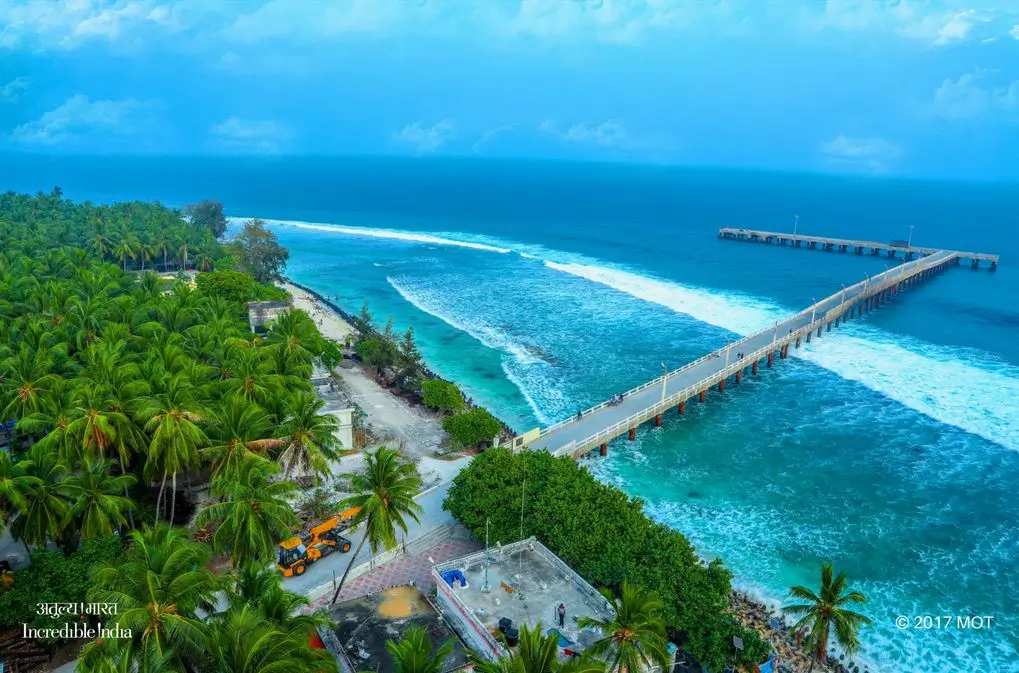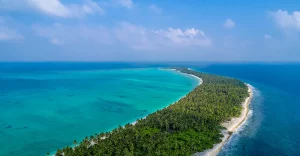Lakshadweep, India’s smallest Union Territory, is a stunning archipelago situated off the southwestern coast of the Indian mainland. This tropical paradise comprises 36 islands, each boasting unique features such as pristine beaches, crystal-clear turquoise lagoons, and vibrant coral reefs teeming with diverse marine life. With only 11 of these islands inhabited, Lakshadweep offers an exclusive and serene getaway to travelers seeking tranquility away from the bustling city life. The islands are not only a haven for beach lovers but also a hotspot for adventure enthusiasts, offering activities like snorkeling, scuba diving, and kayaking, which allow visitors to explore the rich underwater world. The local culture is a tapestry of South Indian and island influences, reflected in the cuisine, lifestyle, and traditional practices of the islanders. Lakshadweep’s commitment to preserving its delicate ecosystem is evident in its conservation efforts, making it a model for sustainable tourism. The best time to visit is between September and May when the weather is most favorable for outdoor activities. The Agatti Island Airport serves as the gateway to this enchanting destination, ensuring accessibility for eager explorers. For those looking to experience the untouched beauty of nature, Lakshadweep is a destination that promises an unforgettable journey.
Why is Lakshadweep better than Maldives?
Lakshadweep and the Maldives both offer stunning tropical destinations, but there are key reasons why some might consider Lakshadweep a better option depending on their preferences:
1. Cost-Effectiveness
- Lakshadweep is generally more affordable than the Maldives, especially for Indian tourists. Flights, accommodation, and activities in Lakshadweep are less expensive, making it accessible for budget-conscious travelers.
- Maldives, though luxurious and well-known for overwater bungalows, can be costly due to high-end resorts and exclusive experiences.
2. Less Commercialization
- Lakshadweep is less commercialized, offering a more pristine, untouched environment. It has fewer resorts, and development is minimal, allowing for a more tranquil, off-the-beaten-path experience.
- Maldives is more developed for tourism, with large resort chains and international attention, which can sometimes make it feel less authentic.
3. Natural Beauty and Biodiversity
- Lakshadweep offers stunning coral reefs and a diverse marine ecosystem, similar to the Maldives. However, since it’s less visited, the reefs and underwater world are often in better condition, perfect for snorkeling and diving enthusiasts seeking unspoiled marine life.
- Maldives also boasts incredible biodiversity, but some areas may face environmental stress due to mass tourism.
4. Eco-Friendly and Sustainable Tourism
- Lakshadweep promotes a model of eco-tourism. It’s focused on sustainability and preserving the local environment, limiting the number of tourists and promoting eco-friendly practices.
- Maldives is gradually incorporating more eco-friendly resorts, but mass tourism poses a greater threat to its environmental sustainability.
5. Cultural and Heritage Connection
- Lakshadweep, being part of India, has a cultural connection for Indian tourists. Visitors can experience the local culture, interact with island communities, and enjoy traditional Kerala-influenced cuisine.
- Maldives is more focused on international tourism and luxury, with many resorts detached from local communities, making it more about the resort experience than local culture.
6. Ease of Travel for Indians
- Lakshadweep is easier for Indian travelers due to its proximity and the lack of visa requirements. It’s a domestic destination, so there are no international travel hassles.
- Maldives requires a visa (though it’s usually given on arrival), and international flights can add complexity and cost.
7. Privacy and Fewer Crowds
- Lakshadweep, with fewer tourists, offers more privacy and a peaceful environment. It’s ideal for those looking to avoid crowds and enjoy the serene beauty of remote islands.
- Maldives can be more crowded, especially in popular resorts.
8. Cultural Familiarity
- Lakshadweep’s cultural ties to India may make Indian tourists feel more at home, while still offering an exotic island experience. The people, language, and food can be more familiar.
- Maldives caters to a broad international audience, which can sometimes make the experience feel more “global” than regionally distinctive.
9. Adventure and Exploration
- Lakshadweep is perfect for those seeking adventure, exploration, and nature-based activities. Its less developed tourism industry means you can explore untouched beaches, lagoons, and smaller islands.
- Maldives is more about luxurious relaxation and water activities, with less emphasis on adventure and exploration beyond the resort.
Conclusion:
Lakshadweep is better than the Maldives for travelers looking for a cost-effective, tranquil, and more eco-friendly escape, especially for Indian visitors who want a domestic destination with minimal commercialization. However, for those seeking luxurious, international resort experiences, the Maldives might be a better choice.






